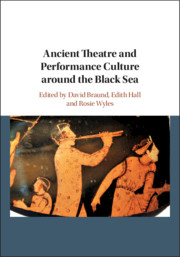Book contents
- Ancient Theatre and Performance Culture around the Black Sea
- Frontispiece
- Ancient Theatre and Performance Culture around the Black Sea
- Copyright page
- Contents
- Figures
- Notes on Contributors
- Preface
- Abbreviations
- Map
- Part I Approaches
- Part II Places
- Part III Plays
- Part IV Performative Presences
- 16 Music and Performance among Greeks and Scythians
- 17 A New Mask and Musical Instruments from the Eastern Bosporus
- 18 The Cult of Dionysus in Ancient Georgia
- 19 Paratheatrical Performances in the Bosporan Kingdom
- 20 Historiography and Theatre: The Tragedy of Scythian King Skyles
- 21 Life Trajectories: Iphigenia, Helen and Achilles on the Black Sea
- Epilogue: Dancing around the Black Sea: Xenophon, Pseudo-Scymnus and Lucian’s Bacchants
- References
- Black Sea Index
21 - Life Trajectories: Iphigenia, Helen and Achilles on the Black Sea
from Part IV - Performative Presences
Published online by Cambridge University Press: 12 November 2019
- Ancient Theatre and Performance Culture around the Black Sea
- Frontispiece
- Ancient Theatre and Performance Culture around the Black Sea
- Copyright page
- Contents
- Figures
- Notes on Contributors
- Preface
- Abbreviations
- Map
- Part I Approaches
- Part II Places
- Part III Plays
- Part IV Performative Presences
- 16 Music and Performance among Greeks and Scythians
- 17 A New Mask and Musical Instruments from the Eastern Bosporus
- 18 The Cult of Dionysus in Ancient Georgia
- 19 Paratheatrical Performances in the Bosporan Kingdom
- 20 Historiography and Theatre: The Tragedy of Scythian King Skyles
- 21 Life Trajectories: Iphigenia, Helen and Achilles on the Black Sea
- Epilogue: Dancing around the Black Sea: Xenophon, Pseudo-Scymnus and Lucian’s Bacchants
- References
- Black Sea Index
Summary
My story today, as my title advertises, concerns the three figures of Iphigenia, Helen and Achilles, their relationships with one another and especially their various romantic liaisons in the context of the shifting sands of mythological possibilities, each according to its own logic. ‘The traditions of Greek mythology’ were flexible, variant and innovating, as Jonathan Burgess reminds us: ‘Myth changed from place to place and from period to period, in response to the needs of media, genre, performance, circumstances, and narrative strategy.’ All of my three figures share what I have called ‘life trajectories’ with a rich array of various alternatives. The Trojan War is obviously the fundamental link between them, the epic struggle in which they all participate as major players: Iphigenia, a hapless victim, as a necessary pre-condition for launching the Greek expedition at Aulis; Achilles, the hero par excellence of all those who fought at Troy; and Helen, well, Helen the ‘face that launched a thousand ships’ and much more. All three are ultimately heroised or divinised in one way or another after death, whether in cult or otherwise, to assure us of their continuing presence, which, for our purposes in the current context, I locate specifically in the region of the Black Sea. And so now to begin.
- Type
- Chapter
- Information
- Ancient Theatre and Performance Culture Around the Black Sea , pp. 453 - 469Publisher: Cambridge University PressPrint publication year: 2019



